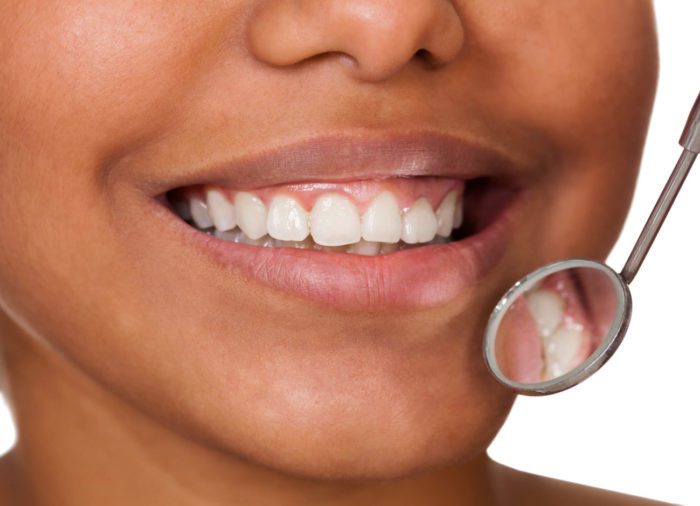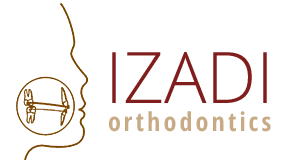When you smile, and too much of your gum tissue shows on the top teeth, this is called a gummy smile. A gummy smile is one of the dental problems Izadi Orthodontics treats in Timonium, MD. This condition often leaves patients very self-conscious about their smiles. Many people do not realize that a gummy smile can be fixed, even though it is based on perception. When the exposed gum tissue measures around 3 millimeters or more, this may be considered an excess amount of visible gum tissue.
Timonium orthodontist Dr. Mohammad Izadi offers comprehensive treatment plans designed to improve the contour and aesthetics of the gums. Using innovative dental technology, Izadi Orthodontics helps patients restore the appearance and health of their gums without the need for oral surgery or other invasive treatments.

Causes of Gummy Smiles
If you have a gummy smile, it can be caused by many things. Understanding the specific cause can help determine the most effective and best course of treatment. While gummy smiles are more prevalent in women, it is possible to see them in men. The most common causes of seeing more gum tissue exposed when smiling include:
- Genetics: Genetics are responsible for natural variations in gum tissue and teeth. Some people are born with small teeth compared to the gums, or teeth with an abnormal size, shape, and position that make their smile appear more “gummy.”
- Lip Size and Movement: Being born with a short upper lip or hyperactive upper lip muscle, where the upper lip rises higher than normal, can expose more gum tissue.
- Gum Tissue Health: Conditions like gingival hypertrophy, where the gum tissue is long, enlarged, or overgrown, can lead to a gummy appearance.
- Abnormal Tooth Eruption: Teeth that have not fully erupted or simply erupt improperly into your gums result in most teeth being covered by gum tissue. This makes the gums appear more prominent and the teeth appear shorter than normal.
- Jaw Development: How your upper jaw bone grows and develops can affect the gum tissue when smiling. If you had a bulging protrusion in your upper jaw during growth and development, it could result in a gummy smile.
- Orthodontic Issues: Misalignment of teeth or how teeth erupted can influence gum visibility.
Gummy smiles can present more than just cosmetic concerns. When the gum line is low or covers a large surface area of the teeth, it can be difficult for patients to receive the dental care they need. Treating gummy smiles can help improve the health and aesthetics of the smile.
How to Fix a Gummy Smile
Gummy smiles can detract from the smile’s appearance and create potential health risks. Treating gummy smiles with laser therapy reduces the risk of developing oral health concerns and improves the aesthetics of the teeth and gums.
Izadi Orthodontics uses laser therapy for soft tissue treatments and gum contouring. Traditional methods to remove gum tissue were painful and required long periods of recovery time. The tissue was actually cut away, repositioned, and then stitched up.
State-of-the-art laser therapy allows for less invasive, more precise treatment of soft tissue dental concerns. Laser treatments reduce swelling and bleeding and eliminate the need for sutures. The innovative technology promotes the body’s natural healing response, reducing downtime and discomfort.
We will begin the procedure by numbing the treatment areas. When you are comfortable, Dr. Izadi will use the laser to shorten and reshape your gum tissue. Since the laser seals off the blood vessels, there will be little to no bleeding. Dr. Izadi’s natural eye for facial aesthetics and advanced training help him provide patients with natural results that promote healthy smiles.
After the procedure, the patient is left with an aesthetically pleasing smile. Our helpful staff will guide you on how to care for your gums following the procedure.
Gummy Smile FAQs
In this Gummy Smile FAQ section, we aim to address common questions about gummy smiles. If you have this condition, we hope we have answered your questions. Please contact our orthodontic office for help with additional questions or concerns.
What causes a gummy smile?
The root cause of gummy smiles is excess gum tissue due to genetics. As adult teeth begin to come in, some patients experience an overgrowth of gum tissue. This may result in a gummy smile.
How long does it take to fix a gummy smile?
The time it takes to fix a gummy smile depends on the amount of dental work needed. Healing post-procedure may take two weeks to two months.
Why do some people have gummy smiles?
Excess gum tissue growth causes gummy smiles. While teeth are growing, sometimes gum tissue continues growing, resulting in a gummy smile.
Can kids grow out of a gummy smile?
Children can grow out of a gummy smile as they age. As new, permanent teeth begin to come in, they may protrude through the excess gum tissue, removing or lessening the appearance of the gummy smile.
Can you fix gummy smiles?
Yes, we can surgically correct gummy smiles. One of the most common ways to do this is a gingivectomy, which removes excess gum tissue to lengthen tooth crowns.
Can braces fix my gummy smile?
Braces can help if your gummy smile results from a jaw issue. They can move your teeth and jaw into better positions to help with excessive gum tissue. However, braces alone most likely will not fix the problem. Dr. Izadi will assess your teeth and gums and suggest your best treatment options. Combining braces with other treatments can provide a more comprehensive solution.
Are gummy smiles common?
Many people have gummy smiles, which are more common in women than men. Gummy smiles affect 14% of the female population and 7% of the male population.
While some people embrace their unique smiles, many patients seek treatment to feel more confident. The number of gummy smiles we see a year will vary, but they are not rare. You might notice them more in some people because they have a bigger smile or a larger upper lip. If you feel self-conscious about your gummy smile, know you’re not alone, and Dr. Izadi can help you.
Will my dental insurance cover my gummy smile?
Dental insurance coverage for gummy smile treatments will vary from patient to patient. Some plans cover orthodontics or surgery if they deem it medically necessary. For example, your dental insurance may cover the treatment if your gummy smile affects your bite or causes other dental issues. On the other hand, most dental insurance policies will not cover gummy smiles because they are a cosmetic procedure.
Can I prevent a gummy smile?
Genetics is a large part of someone having a gummy smile. Therefore, it is hard to prevent. However, if you practice good oral hygiene, it can help. Regular dental visits keep your gums healthy and prevent overgrowth. Brushing and flossing daily removes plaque and bacteria that can cause gum issues.
Avoiding certain medications that cause gum overgrowth might also help. If you notice excess gum tissue, schedule a consultation with your dentist. Early intervention will help prevent minor issues from becoming more significant problems.
Can a gummy smile lead to oral health issues?
A gummy smile usually doesn’t cause health problems, but can make cleaning your teeth harder. Food and bacteria can get caught in the gum tissue more easily, leading to gum disease. You could develop gingivitis or periodontitis if you don’t clean your gums and teeth properly. These conditions can cause swelling, bleeding, and even tooth loss. Regular dental check-ups help keep your mouth healthy. Your dentist can clean hard-to-reach areas and give you tips on maintaining good oral hygiene.
Request an Orthodontist Visit Today for a Gummy Smile in Timonium, MD
Our orthodontist office is located in Timonium, MD. We welcome patients from many local communities, including Mays Chapel, Lutherville, Cockeysville, and the Falls Road Corridor. To begin your orthodontic treatment, contact our office at (410) 919-9806 or request an appointment online, and we will respond to you personally.
